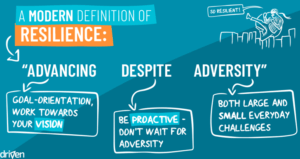By Dzigbordi KWAKU-DOSOO
Entrepreneurship is often romanticized as a journey of innovation and triumph, but the reality is far more complex.
According to the U.S. Bureau of Labor Statistics, about 20% of small businesses fail in their first year, and nearly 50% close within five years. Despite these sobering statistics, some entrepreneurs manage to rise above their challenges, turning setbacks into stepping stones toward success.
What sets these individuals apart is resilience—the ability to adapt, persevere, and thrive in the face of adversity. This article explores the importance of resilience in entrepreneurship, the types of challenges entrepreneurs commonly face, and research-backed strategies to overcome them.
Resilience is the cornerstone of entrepreneurial success. Defined as the capacity to recover quickly from difficulties, resilience allows entrepreneurs to navigate uncertainty and stay focused on long-term goals.
Research by the American Psychological Association highlights resilience as a critical factor in achieving professional success. Entrepreneurs like Mo Abudu, the founder of EbonyLife Media, exemplify this trait. Abudu faced significant challenges in breaking into the male-dominated media industry but remained persistent.
Despite limited initial funding and skepticism about her vision, she built a globally recognized brand that showcases African stories and culture, earning her the title of “Africa’s Oprah.” Her journey highlights the importance of resilience in turning setbacks into groundbreaking success.
Resilience fosters adaptability, helping entrepreneurs pivot when necessary and learn from failure. As Angela Duckworth notes in her book Grit, resilience paired with passion is a predictor of long-term achievement. Without resilience, even the most innovative ideas risk being derailed by inevitable challenges.
Every entrepreneur encounters setbacks, but these challenges often hold the seeds of transformation. Understanding the nature of these obstacles is the first step toward overcoming them and emerging stronger.
Financial difficulties can feel like insurmountable roadblocks—cash flow issues, insufficient funding, or mounting debts threaten to derail dreams. According to a 2022 CB Insights report, 38% of startups fail because they run out of cash. Yet, these challenges are also opportunities to learn financial discipline, think creatively, and build resourcefulness.
Operational challenges, such as inefficiencies in scaling or supply chain disruptions, can strain a growing business. But these moments push entrepreneurs to refine systems, innovate solutions, and ultimately build businesses that are more robust and adaptable.
Personal struggles, including burnout or self-doubt, test an entrepreneur’s mental and emotional resilience. The long hours and weight of decisions can feel overwhelming, but they also present opportunities for self-discovery, growth, and learning how to lean on others for support.
Setbacks may stem from shifting markets, gaps in planning, or unexpected events, but they are not the end of the road. Entrepreneurs who take the time to understand these challenges often uncover the clarity and determination needed to chart a new path forward. Every problem holds a lesson, and every lesson brings an entrepreneur closer to success.

Overcoming the Fear of Failure
Fear of failure is one of the greatest challenges entrepreneurs face, often paralyzing decision-making and stifling innovation. Yet, failure is not the end—it’s a teacher. Research in the Journal of Business Venturing reveals that reframing failure as a learning opportunity not only reduces its psychological burden but also empowers entrepreneurs to grow stronger and more resilient.
Fear doesn’t need to hold you back; it can be transformed into fuel for success. Here’s how:
- Visualize Success: Instead of fixating on what might go wrong, vividly picture your goals and the steps required to achieve them. This mental exercise helps align your focus with opportunities rather than obstacles.
- Celebrate Small Wins: Confidence is built one step at a time. Recognize and reward even minor victories—they are proof of progress and a reminder that you’re capable of achieving more.
- Reframe Failure: Shift your perspective. Failure isn’t a reflection of your worth; it’s valuable feedback. Each misstep offers insights that guide you closer to success.
Consider the story of Anita Erskine, a Ghanaian media personality and entrepreneur. Faced with numerous rejections early in her career, she chose to see those moments not as defeats but as lessons. With unwavering determination, she built a thriving media empire and became a voice for African excellence. Her journey is proof that what seems like failure is often a setup for a greater comeback.
By changing how you view failure, you take its power away. Fear may knock you down, but resilience ensures you rise again—stronger, wiser, and more determined than before.
Resilience is not an innate quality; it is a skill that entrepreneurs can actively cultivate. By adopting specific strategies, business leaders can navigate setbacks with confidence and turn challenges into opportunities for growth. Below are four key strategies, strengthened with actionable insights and examples.
- Embrace a Growth Mindset
A growth mindset is the belief that skills and abilities can be developed through dedication and effort. Entrepreneurs with this mindset view setbacks not as failures but as stepping stones to improvement.
Why It Matters:
Psychologist Carol Dweck’s research shows that individuals with a growth mindset are more likely to persist in the face of difficulties, which is critical for entrepreneurial success.
Actionable Steps:
- Reframe Failure: Instead of saying, “I failed,” ask, “What did I learn?” Write down lessons after every setback and use them to improve.
- Adopt Continuous Learning: Stay curious and seek out books, podcasts, and courses to expand your skills. For example, Elon Musk famously taught himself rocket science by reading books, enabling the success of SpaceX.
- Celebrate Progress: Acknowledge even small wins to stay motivated and keep momentum.
For example, red Swaniker, founder of the African Leadership Group, faced initial resistance to his ambitious goal of developing a new generation of African leaders. By learning from feedback and refining his approach, he built a thriving institution that now impacts thousands across the continent.
- Build a Support Network
No entrepreneur succeeds alone. A strong support network offers guidance, motivation, and fresh perspectives during tough times.
Why It Matters:
The Kauffman Foundation reports that entrepreneurs who engage with mentors and networks are more likely to overcome challenges and achieve business growth.
Actionable Steps:
- Find Mentors: Seek out experienced professionals who can provide advice and insights. Platforms like LinkedIn or local entrepreneurial meetups are great places to connect.
- Join Entrepreneurial Communities: Being part of a group, such as incubators, accelerators, or online forums, provides a space to share challenges and solutions.
- Leverage Peer Support: Collaborate with fellow entrepreneurs to exchange ideas and find mutual encouragement.
For example, Aliko Dangote, Africa’s richest man, often credits his success to learning from peers and mentors. His network has been instrumental in scaling his ventures and overcoming industry challenges.
Emotional resilience is the ability to stay calm, focused, and effective during stressful situations. It empowers entrepreneurs to face uncertainty and adapt to change without losing sight of their goals.
Why It Matters:
According to Daniel Goleman, author of Emotional Intelligence, leaders who manage their emotions effectively are better equipped to inspire their teams and make sound decisions under pressure.
Actionable Steps:
- Practice Mindfulness: Techniques like meditation or deep-breathing exercises can help reduce stress and improve focus. Apps like Headspace or Calm are great tools to start with.
- Journal for Reflection: Writing about challenges and emotions helps clarify thoughts and identify solutions.
- Maintain Work-Life Balance: Schedule time for relaxation and hobbies to prevent burnout.
For example, Njeri Rionge, a Kenyan serial entrepreneur, has faced significant business hurdles. Her ability to manage stress and remain composed allowed her to successfully launch multiple ventures, including Wananchi Online, one of East Africa’s largest internet providers.
- Master the Art of Adaptability
In a rapidly changing world, adaptability is a critical component of resilience. The ability to pivot—whether it’s tweaking a product, changing a business model, or rethinking a strategy—can mean the difference between survival and success.
Why It Matters:
A study from Harvard Business Review found that companies willing to pivot when necessary are more likely to sustain long-term success.
Actionable Steps:
- Monitor Market Trends: Stay informed about industry developments to anticipate shifts and adjust strategies proactively.
- Experiment and Iterate: Treat your business like a scientist treats experiments—test, analyze, and refine.
- Pivot When Needed: Know when to shift focus. Slack, for example, started as a gaming company but pivoted to workplace communication software after identifying a larger market need.
For example, Ivy Barley, a Ghanaian entrepreneur and co-founder of Developers in Vogue. She faced significant challenges in the tech education space but adapted by focusing on empowering African women in technology through tailored programming courses and partnerships with global tech companies. Her innovative approach has set her apart, creating opportunities for African women to thrive in the tech industry.
Entrepreneurship is a journey filled with twists and turns, victories and challenges. Setbacks are inevitable, but they do not define the trajectory of your success—your response to them does. Resilience is the key that transforms obstacles into opportunities, empowering entrepreneurs to learn, grow, and thrive in the face of adversity.
By embracing a growth mindset, building strong support networks, cultivating emotional resilience, and mastering adaptability, you can equip yourself to navigate the uncertainties of entrepreneurship with confidence.
Are you ready for TRANSFORMATION?
Dzigbordi Kwaku-Dosoo is a Ghanaian multi-disciplinary Business Leader, Entrepreneur,
Consultant, Certified High-Performance Coach (CHPC™) and global Speaker.
She is the Founder and CEO of The DCG Consulting Group.
She is the trusted coach to top executives, managers, teams, and entrepreneurs helping
them reach their highest level of performance through the integration of technical skills
with human (soft)skills for personal development and professional growth, a recipe for
success she has perfected over the years.
Her coaching, seminars and training has helped many organizations and individuals to
transform their image and impact, elevate their engagement and establish networks
leading to improved and inspired teams, growth and productivity.










